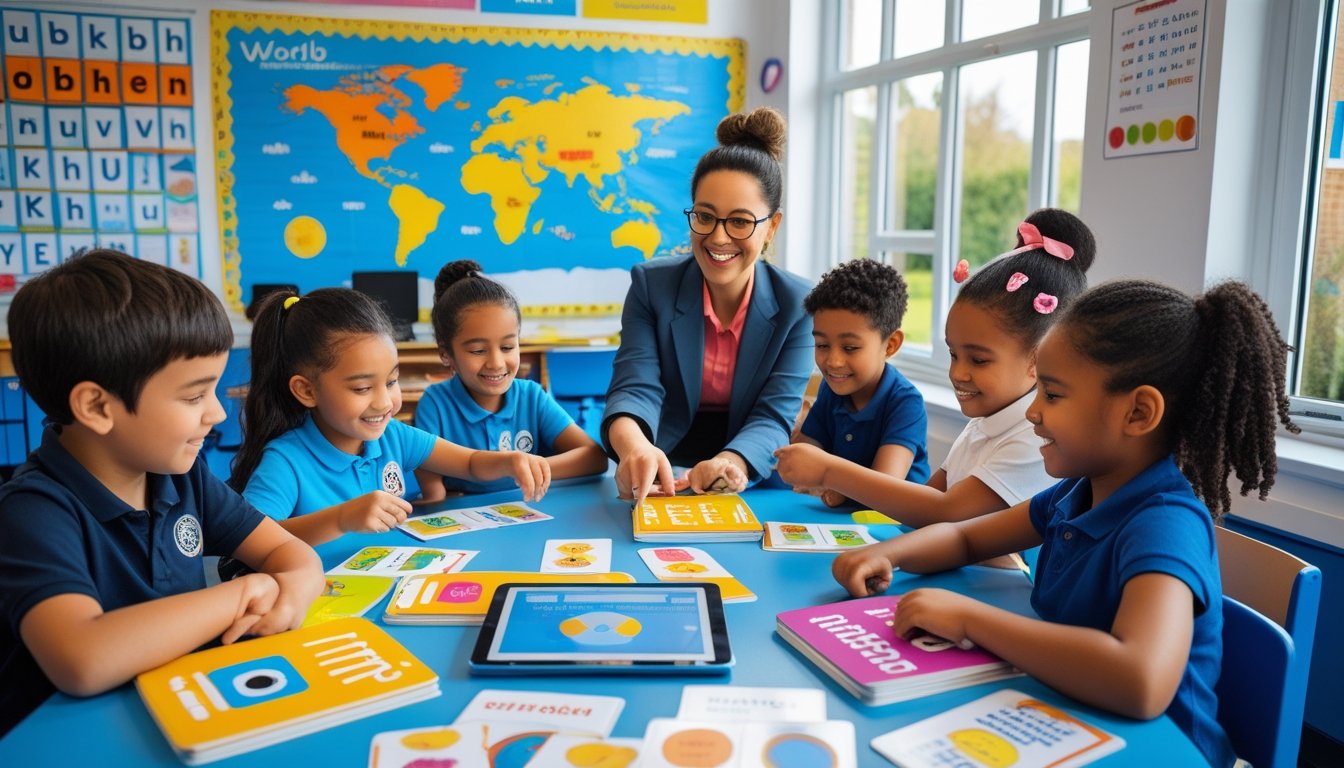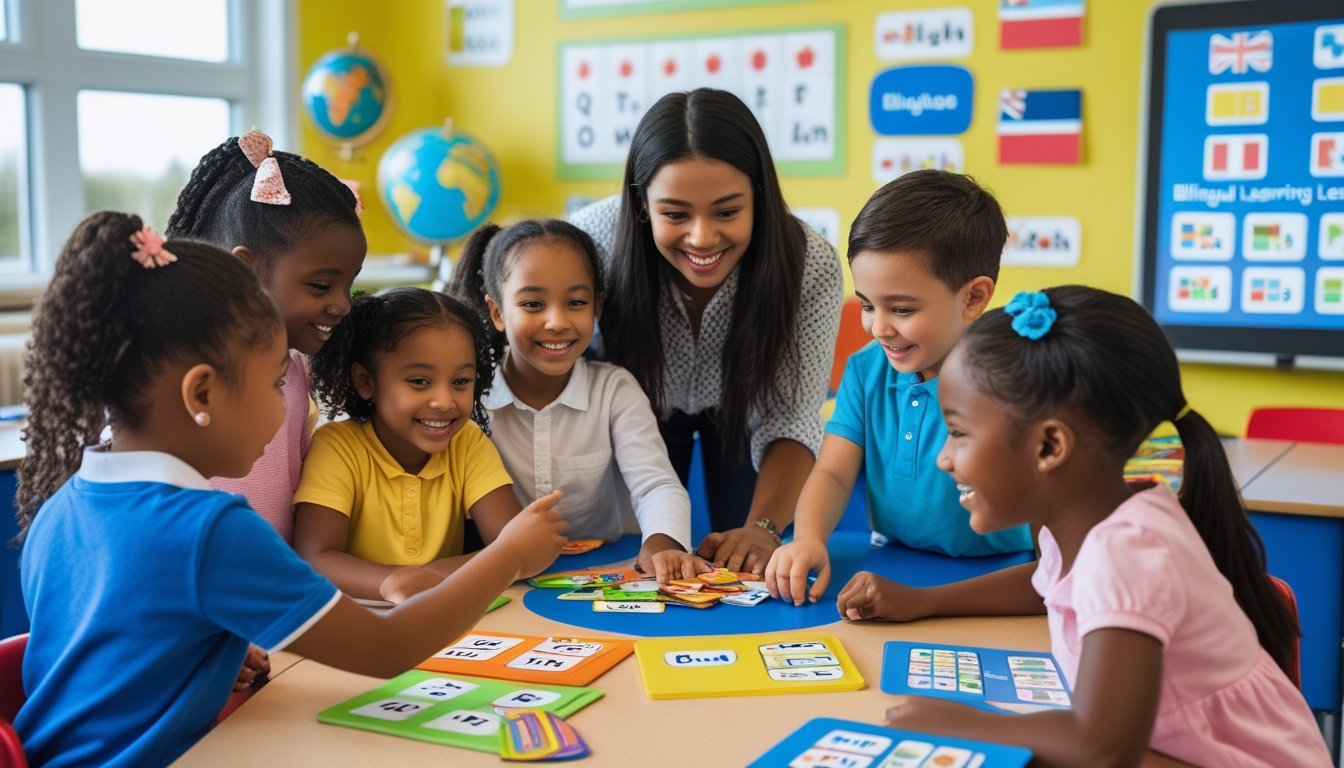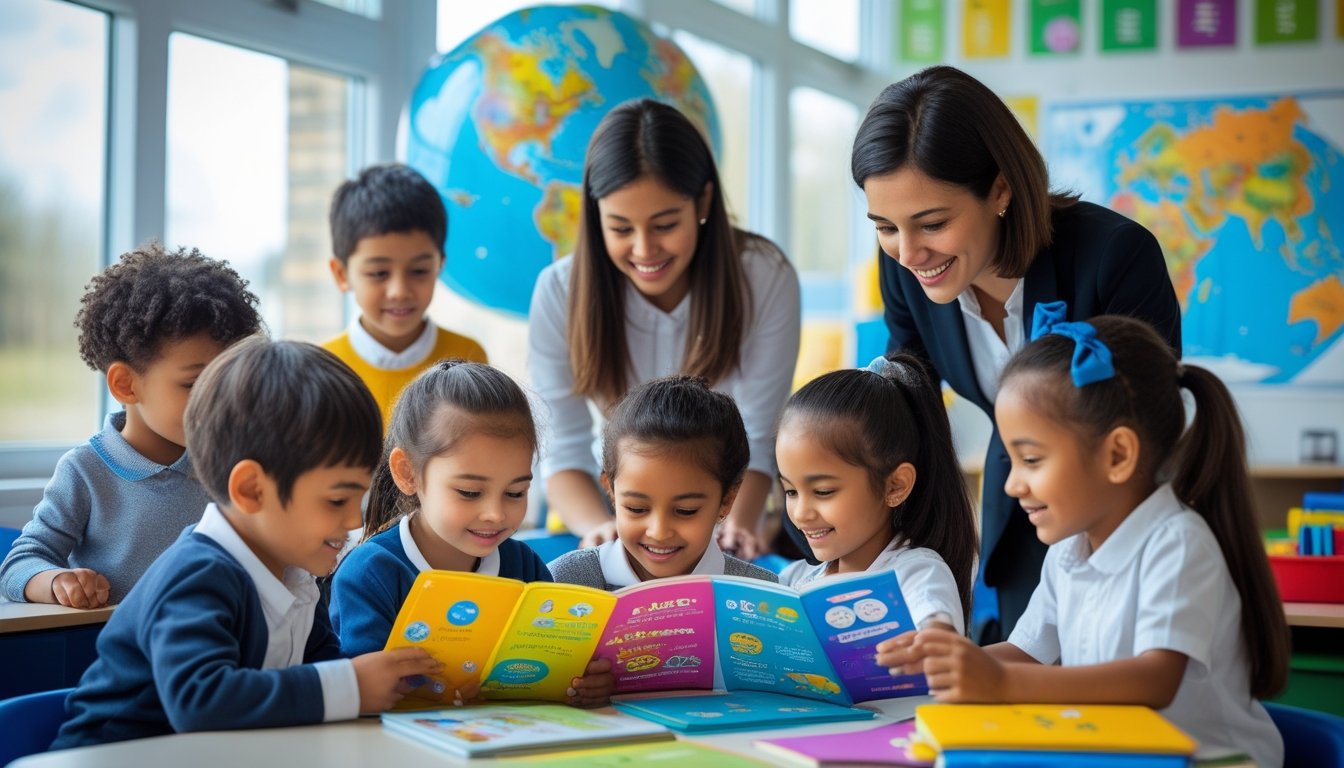Late updated: 28 Jun 2025 11:06
Written by:
Benefits of Bilingual Education for Children in the UK: Inspiring Cognitive and Social Growth
Bilingual education offers a remarkable advantage in the UK, where approximately 20% of children are already acquainted with more than one language. Bilingual education not only enhances children's cognitive development but also equips them with skills that are highly valued in academic and professional contexts. As we explore this topic, it becomes clear that employing a bilingual curriculum can be a key asset for our children's future in an increasingly interconnected world.

Children who learn multiple languages benefit from increased memory, focus, and problem-solving abilities—all crucial skills that support academic achievement. By introducing children to bilingual education from an early age, we allow them to reap these cognitive benefits and potentially outperform their monolingual peers in several academic areas.
Moreover, bilingual education positions children for a broader range of future opportunities. In our globalised society, the ability to communicate in multiple languages is invaluable, opening doors to international prospects and cross-cultural experiences. This isn't just about academic success but also about nurturing a well-rounded individual prepared for the complexities of life in the modern world.
Key Takeaways
- Bilingual education enhances cognitive and academic skills.
- Learning multiple languages boosts future career opportunities.
- Starting early provides long-term benefits in a globalised society.
Key Benefits of Bilingual Education for Children in the UK
Bilingual education offers numerous benefits for children in the UK, from cognitive enhancements to improved social skills. These advantages significantly shape their development and prepare them for a diverse world.
Cognitive Advantages of Bilingualism
Children exposed to bilingual education often showcase superior cognitive abilities. Our minds are wired to process languages intricately, and learning multiple languages enhances these natural capacities. Cognitive benefits include improved executive functioning, critical for tasks requiring attention, problem-solving, and multitasking.
Bilingual children typically demonstrate enhanced memory, better listening skills, and greater metalinguistic awareness. This awareness helps them recognise language structures more effectively, fostering adaptability. The mental agility gained from bilingualism develops their creativity, enabling them to approach challenges with innovative solutions.
Academic Achievement and Language Skills
Bilingual education lays the foundation for significant academic benefits. Our students who engage in such programs often experience higher levels of academic achievement. These children develop language skills in both their first language and any additional languages they learn.
Fluency in multiple languages can directly impact academic performance, often translating to better literacy skills and improved communication abilities. Learning a second language also boosts their ability to acquire knowledge in subjects like science and maths, as cross-linguistic skills support broader learning capacity.
Cultural Awareness and Identity Development
Incorporating bilingual education into early childhood establishes strong cultural awareness and identity. Our children learn not only different languages but also the cultural contexts surrounding them. This exposure fosters open-mindedness and empathy, crucial traits in our increasingly interconnected world.
Cultural appreciation becomes a core part of their identity, helping them develop a deeper understanding of themselves and others. Families often find that bilingual education strengthens connections to cultural heritage, enabling children to embrace both Welsh and British identities effectively.
Social and Emotional Growth
Through bilingual education, our students gain extensive social and emotional growth. The interaction with diverse languages and cultures enhances their social skills, encouraging more inclusive communication practices. Bilingual children often display higher self-confidence and develop higher self-esteem, as they are empowered to navigate multiple social environments successfully.
The ability to engage in conversations across languages can lead to stronger relationships and improved collaboration skills. As these children grow, they exhibit a remarkable capacity for adaptability, equipping them to thrive in diverse settings and form meaningful connections with peers from various backgrounds.
Future Opportunities and Practical Considerations

In the UK, bilingual education opens doors for children, presenting numerous future opportunities. As we delve into career prospects, the importance of home languages, and long-term health outcomes, the advantages of bilingualism unfold in practical contexts.
Career Prospects and Earning Potential
A bilingual education significantly enhances one's position in the global economy. With growing demand for bilingual professionals, career opportunities for bilingual individuals are multiplying rapidly. Employers value employees who can communicate in multiple languages, as this skill facilitates international business operations.
Bilingualism often leads to higher earning potential. As private tutors and bilingual tutors, bilingual individuals can command premium rates, especially in sectors like translation, teaching, and international relations, where language skills are at a premium, showcasing the tangible benefits of a bilingual upbringing.
The Role of Home Languages and Bilingual Schools
Home languages play a pivotal role in solidifying language structure and fluency. Children who maintain proficiency in their home language alongside a second language often achieve more robust linguistic skills. This dual-language foundation bolsters confidence and adaptability in diverse settings.
Bilingual schools provide a structured environment for nurturing language skills. Their specialised curriculum equips students with the ability to navigate multiple languages easily. As a result, graduates of bilingual schools often find themselves better prepared for the dynamic demands of the modern workforce.
Health and Long-Term Outcomes
Bilingualism is not only beneficial for career prospects but also offers significant health benefits. Engaging in multiple languages is known to enhance cognitive flexibility, potentially delaying the onset of dementia. These cognitive advantages extend well into adulthood, contributing to sharper mental acuity.
Additionally, mental exercises associated with switching between languages foster resilience and adaptability. Such abilities can promote overall well-being, ensuring that bilingual individuals maintain a competitive edge in various aspects of life. As we explore these health aspects, the lasting impact of bilingual education becomes evidently clear.
Frequently Asked Questions

Exploring bilingual education for children in the UK involves addressing various questions from cognitive benefits to academic performance and social impact. Our focus is to clarify common concerns and provide practical advice for parents navigating bilingual learning for their children.
What are the cognitive advantages of bilingual education in early childhood?
Bilingual education enhances cognitive skills such as memory, problem-solving, and multitasking. Children learning two languages often demonstrate greater mental flexibility and creativity. This stems from their ability to switch between languages, which strengthens their executive functions.
How does dual language learning impact a child's academic future?
Learning in two languages can lead to improved literacy and academic achievement. Bilingual students often perform better in standardised tests and have the potential to access a broader range of educational opportunities. Universities and further education institutions view bilingualism positively, recognising the diverse skills it fosters.
In what ways can parents promote bilingualism at home for their children?
Parents can encourage bilingualism by creating a language-rich environment at home. Reading books, singing songs, and having regular conversations in both languages are effective ways to support language development. Consistency and positive reinforcement play vital roles in nurturing a child's linguistic abilities.
What are the social benefits of being bilingual from a young age?
Being bilingual provides social advantages by enabling children to connect with a wider range of cultural backgrounds. It promotes empathy, cross-cultural communication, and the ability to build diverse friendships. Bilingual children may feel more confident in social settings due to their enhanced communication skills.
How does bilingual education influence speech and language development in infants?
Exposure to multiple languages does not hinder speech development. Infants can differentiate between languages from an early age, and bilingual education supports robust language development. It encourages early phonetic awareness, which can lead to a deeper understanding of linguistic nuances.
What strategies are effective in supporting less vocal children in a bilingual learning environment?
To support less vocal children, we recommend interactive activities that encourage participation without pressure. Storytelling, play-based learning, and group activities can help children feel more comfortable expressing themselves. Providing a supportive and nurturing environment is key to enhancing confidence.
